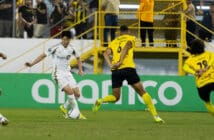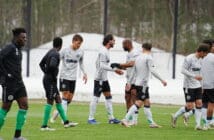In most groups at a major tournament, in whatever situation, one sides usually stands out as the weakest, the side who will just fall short, or even be the group’s whipping boys. The former two of these definitely define the current public perception of Finland going into Group B at Euro 2020 this summer, perhaps even the latter to the uneducated audience.
The common narrative, much like say Northern Ireland upon qualifying for Euro 2016, was that this group of players gelled at the perfect time, reinforced by a slight boost in quality, and whose qualification was only facilitated by an extremely kind qualifying group.
One would perhaps twist this narrative even further by claiming that four defeats from 10, including defeats in Bosnia and Herzegovina and Greece, with only narrow on-paper wins over said sides on home soil, suggest a story of minnows chancing their luck.
This could not be further from the truth. Coach Markku Kanerva has had this in the works for a while now- coach of their U21s in 2009 for their only ever qualification for the final Euro U21 tournament, assistant manager for five years, before taking on the top job from 2016 onwards to finalise the development of the group of players from that golden 2009 batch. This culminated in a Euro 2020 qualifying group which was in no way a flash in the pan.
During the 2018 World Cup qualifiers, desperately unlucky results away in Iceland (conceding two goals to succumb to defeat in the final five minutes) and at home to Turkey coupled some real positives, not least in the home leg against Iceland where the 1-0 victory didn’t reflect the true dominance had in the game.
Such positives continued into their 2018 Nations League Group C campaign, guaranteeing themselves a playoff spot after winning their group with four wins from six, before deciding they wouldn’t need that safety net to complete a very successful calendar year in 2019.
Although their qualifying group undoubtedly helped- catching Bosnia and Herzegovina and Greece at particularly low ebbs at the crux of that, they were excellent value for all six of their wins, and were cruelly denied a home draw against Italy after a farcical hand ball call in the final quarter of the match.
It is the first time Finland have qualified for a major tournament, so one would be forgiven for thinking that the year-long delay to the tournament would harm the Huuhkajat by dissipating the momentum after the most successful year ever in Finnish football. However, the delay has benefitted the Finns for a plethora of reasons. The 2020 Nations League gave Kanerva a chance to develop the side tactically, diversifying their options away from a 4-4-2 that had been perennial for them between 2018 and 2019.
The newly tested 3-5-2, evidently successful given how it continued to be utilised during the round of 2022 World Cup qualifiers in March, has lessened the burden on pivotal midfielders Glen Kamara and captain Tim Sparv, meanwhile maximising the output out of their new glut of attacking full backs, especially QPR’s Niko Hämäläinen.
Marcus Forss has had an extremely promising season at Brentford, and Onni Valakari, son of Motherwell icon Simo, both scored on their international debuts away at world champions France last November, the latter with an absolute screamer.
Elsewhere, key players have jumped a level in quality during the 2020/21 domestic season, most notably Glen Kamara, their Duracell, line-breaking -with-crisp-passing midfielder who has been standout for Rangers during their record-breaking season.
Perhaps most importantly, Joel Pohjanpalo, a continual underachiever, and icon Teemu Pukki (now famous enough to replace Ice Hockey icons in advertising domestic rye bread brands) have both hit top form after patchy goalscoring records during the 2019/20 season (made more urgent by the fitness concerns of the latter).
Crucially, all of this promise has manifested itself in all of Finland’s fixtures in the ‘Covid era’. Four comfortable wins over the Republic of Ireland and Bulgaria exemplified this, and they were perhaps unfortunate to be turned over by Wales in Helsinki in their Nations League opener. And, best of all, this Finland side claimed their first ever big scalp, with an outstanding 2-0 friendly win over the world champions in Paris with a semi-rotated side.
The result was in no way a smash-and-grab, and it should give them confidence that they can get a result out of the final game against Belgium, who could put out a second string after wrapping up top spot with two wins in their opener. As for Finland’s opener against Denmark, though the Danes are rightfully considered as the tournament’s dark horses, Finland will relish being the underdogs against their Nordic rivals.
Russia will be the match they look to get three points from- and given the history between the two nations- the Huuhkajat would love nothing more than spoiling the party on St. Petersburg soil, a city with such historical significance in the Finnish Winter War of 1940. The narrative is set.
Anyone expecting a Nul Points and no goals showing may need to think again. But they’ve got all of spirit, quality and efficiency, which is, as the last few tournaments have shown, the crucial formula for a good showing.
Follow us on Twitter @ProstInt
![Prost International [PINT]](https://prostinternational.com/wp-content/uploads/2021/08/PINTtFontLogoRoboto1536x78.jpg)


